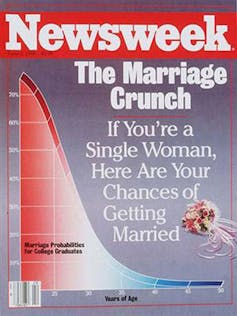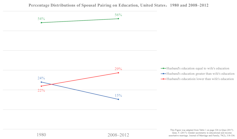Having a dedicated associate and good household relationships are necessary to most individuals. Numerous novels, fairy tales and films have advised romantic tales about love that endear us to the concept of romantic love.
Sociologists, nevertheless, are much less romantic. In terms of falling in love, it’s not simply destiny or serendipity that carry individuals collectively—social components matter.
How so? My analysis illustrates how our attitudes in direction of Mr. or Ms. Proper are filtered via the lens of social norms.
Although a few of us are too younger to recollect, about three a long time in the past, the wedding prospects of extremely educated ladies had been the topic of headlines and made the quilt of Newsweek journal in 1986.

The memorable media messages produced robust emotions of tension in a variety of ladies. The story as portrayed within the romantic comedy Sleepless in Seattle went like this: “It’s simpler to be killed by a terrorist than it’s to discover a husband over the age of 40.”
The standard knowledge was that girls over 40 who had achieved a sure degree {of professional} (and academic) objectives had a decrease marriageability.
Is it really true? Do ladies who spend years in class getting a superb schooling sacrifice their possibilities of getting married?
Really, no. Analysis has constantly discovered that American ladies with not less than a bachelor’s diploma usually tend to get married and keep married than much less educated ladies.
Actually, only some years after the Newsweek story, household sociologist Andrew Cherlin debunked the deceptive and incorrect messages about skilled ladies’s marriage prospects.
Husband-wife schooling gaps
Contents
In the USA, ladies lagged behind males in school completion earlier than the Eighties, however by 2013, ladies earned about 60 per cent of bachelor’s and grasp’s levels and half of all doctoral levels.
My analysis took information from the 1980 U.S. Census and the 2008–2012 American Group Surveys to look at spousal pairings, and checked out schooling and earnings ranges amongst newlywed {couples}. I discovered that between 1980 and 2008–2012, ladies had been more and more prone to marry males with much less schooling than that they had.

Andre Hunter/Unsplash

Writer supplied (no reuse)
The proportion of {couples} by which the husband had extra schooling than the spouse dropped nearly 10 share factors, from 24 per cent in 1980 to fifteen per cent in 2008–2012 (see the blue line within the zoomable graph, proper). Throughout the identical interval, the share of {couples} by which the spouse had extra schooling than the husband elevated from 22 per cent to 29 per cent (the purple line).
So, throughout 2008–2012 within the U.S., ladies had been extra probably than males to be the extra educated partner in marriage.
Since males have traditionally been anticipated to be the breadwinner and “the pinnacle of” the household, I puzzled if these schooling pairings modified their breadwinner roles?
Does schooling equal extra energy in marriage?
The pairing between a better-educated spouse and a less-educated husband doesn’t imply that the spouse is the particular person with larger assets or energy in marriage.
Usually, ladies proceed to marry males whose earnings exceeds their very own. This isn’t stunning, given that girls nonetheless earn much less than males and the husband breadwinning norm persists.

Sebastian Pichler/Unsplash
My analysis discovered that the tendency for ladies to “marry up” when it comes to earnings was larger once they “married down” in schooling. In different phrases, women and men nonetheless are likely to kind marriages by which the spouse’s socioeconomic standing doesn’t exceed that of the husband.
Though males have positioned extra significance on the monetary prospects of a possible partner over time, they could worth ladies’s excessive standing solely as much as the purpose the place their associate’s standing exceeds their very own. On this manner, males could hesitate to marry ladies who’ve each extra schooling and better earnings than they do.
In the meantime, since earnings inequality has elevated dramatically in latest a long time, ladies could have extra to lose in the event that they marry down economically.
‘Left-over women’ in China
So, within the U.S., extremely educated women and men are already extra probably than their much less educated friends to get married. Against this, in China, extremely educated ladies (however not extremely educated males) could face nice challenges discovering a partner.
Chinese language ladies have outpaced males in school enrolment as nicely. My earlier analysis on up to date city China discovered that as schooling will increase for ladies, the chance of them discovering a match for marriage decreases, whereas the probabilities enhance for males.
Chinese language media and the general public use a derogative time period, “leftover women,” to explain these city, extremely educated single ladies. In China, the low marriage prospects of extremely educated ladies are intently linked to the roles that husbands and wives are alleged to play within the household.

Yiran Ding/Unsplash
The breadwinner position of the husband and the homemaker position of the spouse stay firmly in place in Chinese language households. On this context, career-oriented ladies are generally criticized as “egocentric,” “non-feminine” and “irresponsible to family wants,” whereas husbands’ failure to fulfil the supplier position is commonly the first supply of marital battle.
In contrast to the U.S., the place males now are likely to marry ladies extra educated than themselves, the normal follow of males marrying ladies with much less schooling than they’ve persists in China.
Though each China and the U.S. witnessed the gender-gap reversal in larger schooling, the U.S.-China distinction in marriage patterns means that structural components, resembling gender norms in society, play an necessary position in shaping particular person marriage prospects.
It was a extensively held social norm that males ought to marry ladies who had been much less educated than themselves. This norm labored nicely up to now when a university schooling was unusual and males usually had extra schooling than ladies. Within the U.S., the cultural evolution of mate preferences corresponds to modifications in males’s and ladies’s instructional attainment.
However in city China, this isn’t the case. The motion towards egalitarian gender roles doesn’t go hand-in-hand with speedy social modifications. Extremely educated Chinese language ladies acquire little from the male breadwinner-female homemaker marriage; as an alternative, they’re prone to delay and even forgo marriage.
For the reason that reversal of the gender hole in schooling is taking place nearly globally, it will be nice to get extra data so we are able to perceive how the rising feminine benefit in schooling will influence marriage and household lives.
In terms of marriage, it’s not destiny and love that carry individuals collectively—social components, like schooling and prevailing gender norms, matter.
Supply By https://theconversation.com/does-being-smart-and-successful-lower-your-chances-of-getting-married-100169